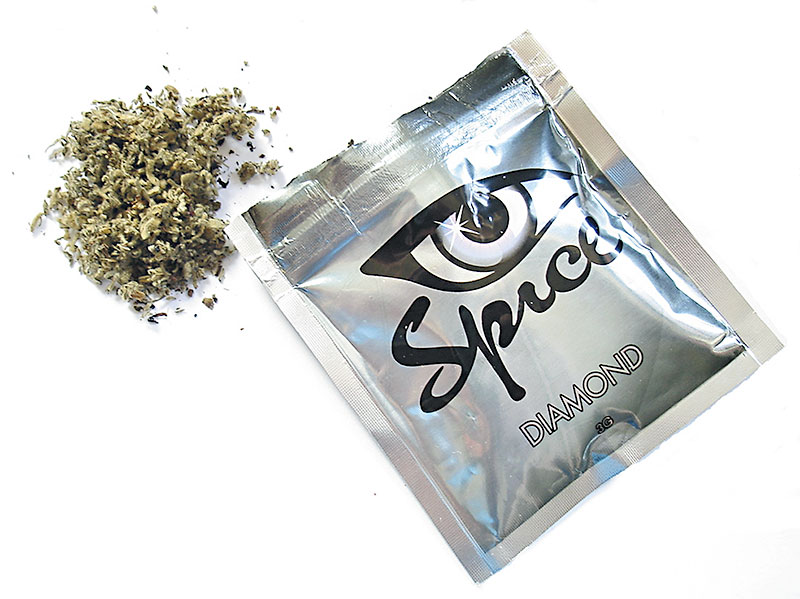Is K2 Unstoppable?
Synthetic pot confounds regulatory efforts
By Nina Hernandez, Fri., June 12, 2015
Bad batches of synthetic marijuana – also called K2, spice, or roughly a hundred other stylized brand names – are still sending Texans to the emergency room, even after the DEA banned the original form of the drug nationwide in 2012. Marketed word-of-mouth by people looking to dodge drug tests, K2 is still being produced by large-scale manufacturers, in Texas and beyond. K2-induced side effects, which can include vomiting, high blood pressure, and even seizures and hallucinations, have caused a sudden, alarming rise in trips to Austin-area ERs. On Tuesday, June 9, Austin-Travis County EMS reported that it has received 127 K2-related calls and 147 patients since May 29.
Once the original chemical compounds were banned on the federal and state levels, entrepreneurs both overseas and homegrown began to tweak the formula – named JWH for its creator, chemist John Huffman. These later versions created vaguely the same effect, but police have been stymied in their ability to make arrests if the molecular structure of the substance varies by even a hydrogen atom from that outlawed by legislation. Marked with a "not for human consumption" disclaimer, the product can still be found for about $10 per gram in most local head shops, and is available in bulk online.
"We're chasing our tail," admitted Austin Police Department forensic scientist Ralph Salazar in an interview with the Chronicle. "Most of the time, it's not difficult to figure out an analysis on these things. They're all closely related from a chemistry standpoint. But the problem becomes legislation."
After overseas chemists produce it in its initial powder form, K2 is shipped into Texas, where it is turned into a liquid that can be spread on tobacco or any other number of substances people would be willing to smoke. Salazar noted that early batches, before the wave of post-2011 regulation, looked and smelled so similar to marijuana that officers on the street often couldn't distinguish between the two drugs. More recent concoctions have looked more like potpourri, and tasted not much better. The obvious appeal of "spice," other than its ostensible legality, is the inability of most labs to distinguish it on a urine test. Salazar said some compounds will show up on tests, but, unlike marijuana, their half-life is so brief, the chances are slim.
These qualities have turned the drug into the South's latest cash crop.
Sen. Joan Huffman, R-Houston, shepherded SB 173 through this year's legislative session. The bill, aimed at tightening the regulation of synthetic drugs, was signed into law by Gov. Greg Abbott this month and will take effect in September. However, Salazar was quick to temper expectations. It'll be a matter of months before chemists find ways to further tweak the compound – making new laws obsolete even before the lawmakers end their vacations. Once the mutated supply enters the market, the process of identifying and documenting the changes begins again. If anything, Salazar said, the problem has gotten worse. "So we send out a lab report with our little phrase: 'No controlled substances detected,'" he said. "We know what it is, we know it's a cannabinoid – it's probably acting the same way in their body, but technically the compound has been altered just enough that this person hasn't done anything wrong. And so our hands are tied."
On the street, APD Detective Shane Streepy has dealt with K2's worst side effects, and struggled to trace batches that sent a handful, or in some cases dozens, of people to the hospital. "We get the call that multiple people were basically dropping down at the ARCH [Austin Resource Center for the Homeless]. When I went down to try to talk to some of these people who just got put in the hospital, these people were almost psychotic," Streepy recalled. "They weren't responding to simple questions; they're laid out in the bed and they're not with it."
Even if he could coax a response out of any user, there's still the sheer overwhelming amount of traffic at the Seventh Street shelter, which makes it virtually impossible to know how many different people handled the drug, and with what intentions.
"There are claims that this person bought some from somebody he didn't know, and the word is it was sprayed with, I heard, Raid at one point," Streepy said. "I remember hearing at the last overdose that it was PCP. That's the other issue we have with this stuff – the foil bags aren't sealed by the FDA. You don't know what was put into them."
Austin native Bryan, whose last name has been withheld, used K2 regularly before it was banned. Though in that seven- or eight-month period he mostly felt his "stomach turn," he also experienced hallucinations and extreme anxiety. "I didn't really black out," Bryan said. "The time with the lizard was kind of weird – when I thought my hand had turned into a lizard and I almost cut it off ... I woke up the next morning like, 'I almost cut my hand off. I'm never doing that again.'"
KXAN reported last November the owners of the Smoke Shop, a head shop on Montopolis near 183, were arrested for distributing K2, after a bad batch sent two dozen people to the ER. In April, another outbreak struck the Downtown area, this time closer to the University of Texas campus. "Because of the overdoses, we just saw people who got sick," Streepy noted. "But I've talked to other people who say they've been K2 smokers for 10 years, and they like it. Nothing happens to them. They don't understand why people get sick."
Got something to say on the subject? Send a letter to the editor.











